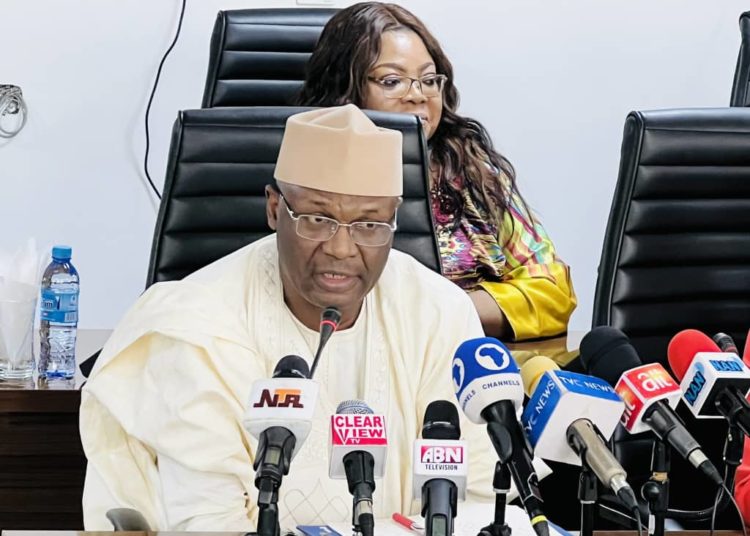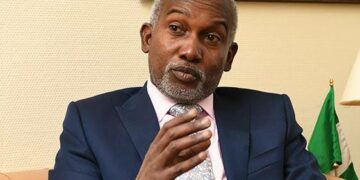The Independent National Electoral Commission (INEC) has ruled out the possibility of inmates in correctional facilities across the country voting during the 2023 general election.
INEC chairman Prof Mahmood Yakubu, who stated this when the management team Nigeria Correctional Service paid a courtesy visit to the Commission headquarters in Abuja yesterday, stressed the need to meet critical thresholds before the inmates can vote.
Noting that with only seven months to the general election there was a possibility to work out the modalities for the inmates to vote, he said: “the next general election is not going to be the last election conducted by Nigeria.”
He added, “So even if we don’t meet all these critical thresholds for 2023, we will continue with a discussion to see what happens beyond 2023. These are really germane issues that we need to discuss very carefully.”
Speaking further, he said: “In principle, the request by the Correctional Service to extend voting rights to inmates of our is agreeable. In principle, we have no issues with that. The representative of the CG also referred to a recent judgment, actually it is an old judgment from the Federal High Court in Benin.
“And we have been discussing this with the Correctional Service before the 2019 general elections. So we are committed to inclusivity including the rights of inmates to vote during the elections.”
However, he stressed the need to discuss the practicalities of how this can be achieved in Nigeria.
He also stressed the need to thread carefully saying, “We need to work things out carefully.”
He continued: “Let me start with the legal framework. Section 12(1) of the Electoral Act 2022 lists five qualifications for registration as a voter in Nigeria because you have to register as a voter before the right to exercise that right as a voter is conferred.
“Number one, the prospective registrant must be a Nigerian citizen. Number two, he or she must be 18 years of age, at least. Number three, he or she must originate, reside or work in the local government or ward covered by the registration center or the point of registration.
“Number four, that citizen of Nigeria must present himself or herself to the registration officer for registration as a voter. And number five, which is really critical to our discussion today is that he or she must not be subject to any legal incapacity to vote under any law, rule, or regulation imposed in Nigeria.
“So this is one area that we need to discuss so that we know the categories of inmates that will exercise the right to vote and I’m happy that you came with your director, legal.
“We need to work things out carefully. We want transparency of the process. Because everything that we do in the commission, particularly when it comes to the rights of citizens to vote, must be done transparently.”
While interrogating the demand of the Service, Yakubu said: “Will inmates vote outside the prison or inside the prison?
So are we going to set up polling units inside the prisons or there will be polling units outside the prisons.”
Yakubu said since the majority of inmates are awaiting trial, the Commission believes that some of them are already registered voters, and the majority of them are actually awaiting trial.
“So they may not be registered voters. If they are registered voters, they can’t be registered. What they will do is transfer their registration. Will they transfer their registration to the correctional centers for that reason?
“Now will political parties be allowed to campaign inside the correctional centers? This is a matter that you need to advise the commission. Will observers and the media be allowed access to the correctional centers on election day so that the process is really transparent, and we observe what is happening? Will INEC officials be granted access to the correctional centers for voter education? This is a matter that we need to discuss?
“Will the election holding all 218 Federal Correctional centers currently holding inmates nationwide? Or there are some correctional centers where this process can start instead of over 218. We understand that some of the correctional centers are not holding inmates at present. So the process be allowed to cover all the 218 centers?
“So these are some of the issues that we need to carefully discuss and resolved before a decision is taken. But in principle, the commission is committed to ensuring that all Nigerians are given the right to vote and be voted for but in this particular case, the right to vote, which is exercisable under the law. So the sooner we are able to address these issues, the better for the process.”
Earlier, The Controller General of the Nigerian Correctional Service Haliru Nababa who was represented by Daniel Odaro said the Service was meeting with INEC to work out the modalities for the inmates to vote in the forthcoming elections.
He said: “The court recently gave the judgement in favour of inmates to vote in elections to select leaders. The modalities to meet the process need to be worked out and so we need to be here to discuss with INEC to find out how this process can be achieved.”





